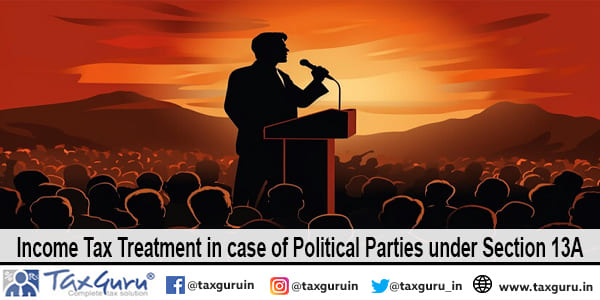Introduction: Section 13A of the Income Tax Act outlines the tax treatment of political parties in India, providing exemptions for certain types of income. Political parties are exempted from including income from house property, other sources, or capital gains, as well as voluntary contributions, in their total income, subject to specific conditions. These conditions include maintaining proper accounts, auditing by a qualified accountant, and reporting contributions exceeding Rs. 20,000 to the Election Commission. Additionally, electoral trusts are also granted exemptions under Section 13B if they meet certain criteria, including distributing a majority of donations to registered political parties. Compliance with these provisions ensures transparency and accountability in political funding.
Any income of a political party which is chargeable under the head “Income from House Property” or “Income from Other Sources or “Capital Gains” or any income by way of voluntary contributions received by a political party from any person shall not be included in the total income of the Previous Year of such political party subject to the following conditions:
1. The political party keeps and maintains such books of account and other documents as would enable the Assessing Officer to properly deduced its income from there.
2. The political party keeps and maintains a record of each voluntary contribution in excess of ` 20,000 and of the names and addresses of the persons who have made such contribution.
3. The accounts of the political party are audited by an accountant as defined in the Explanation to sub-section 2 of section 288.
4. The treasurer of such political party or any other person authorized by the political party in this behalf shall in each financial year prepares a report in respect of contribution received by the political party in excess of Rs. 20,000 from any person or company in that year and submit it, before the due date of submission of return of income, to the Election Commission.
Voluntary contribution received by Electoral Trust [Section 13B]
Any voluntary contribution received by an electoral trust shall not be included in the total income of the Previous Year of such electoral trust if –
(a) such electoral trust distributes to any political party, registered under section 29A of the Representation of the People Act, 1951, during the said Previous Year, 95 percent of the aggregate donations received by it during the said Previous Year along with the surplus, if any, brought forward from any earlier Previous Year; and
(b) such electoral trust functions in accordance with the rules made by the Central Government

Note: in order to claim exemption in respect of voluntary contributions exceeding Rs. 20,000, a political party is required to keep and maintain a record, and names, addresses of persons who have made such contributions. The legislative intention is to ensure that there is transparency in the process of collection of funds [Common Cause vs. Vol. 222 ITR 260 (SC)]. Hence, no exemption can be allowed in respect of contributions exceeding Rs. 20,000 from persons who have secreted their names.
Return of Income of Political Parties [Section 139(4B)] (1)
(1) Under this section, a political party is required to file a return of income if, before claiming exemption under section 13A, the party has taxable income.
(2) The grant of exemption from Income-tax to any political party under section 13A is subject to the condition that the political party submits a return of its total income within the time limit prescribed under section 139(1).
(3) The chief executive officer of the political party is statutorily required to furnish a return of income of the party for the relevant Assessment Year, if the amount of total income of the Previous Year exceeds the basic exemption limit before claiming exemption under section 13A.
Conclusion: The provisions of Section 13A and 13B of the Income Tax Act play a crucial role in regulating the taxation of political parties and electoral trusts in India. By providing exemptions for certain types of income and imposing reporting requirements, these provisions aim to promote transparency and accountability in political funding. It is essential for political parties and electoral trusts to adhere to these provisions diligently to maintain compliance with tax laws and uphold democratic principles.
****
if you have any doubt on any of the above mentioned matter , please free to speak with us on following contact details: Vivek Malhotra | Direct Tax Expert | 97807-54114





